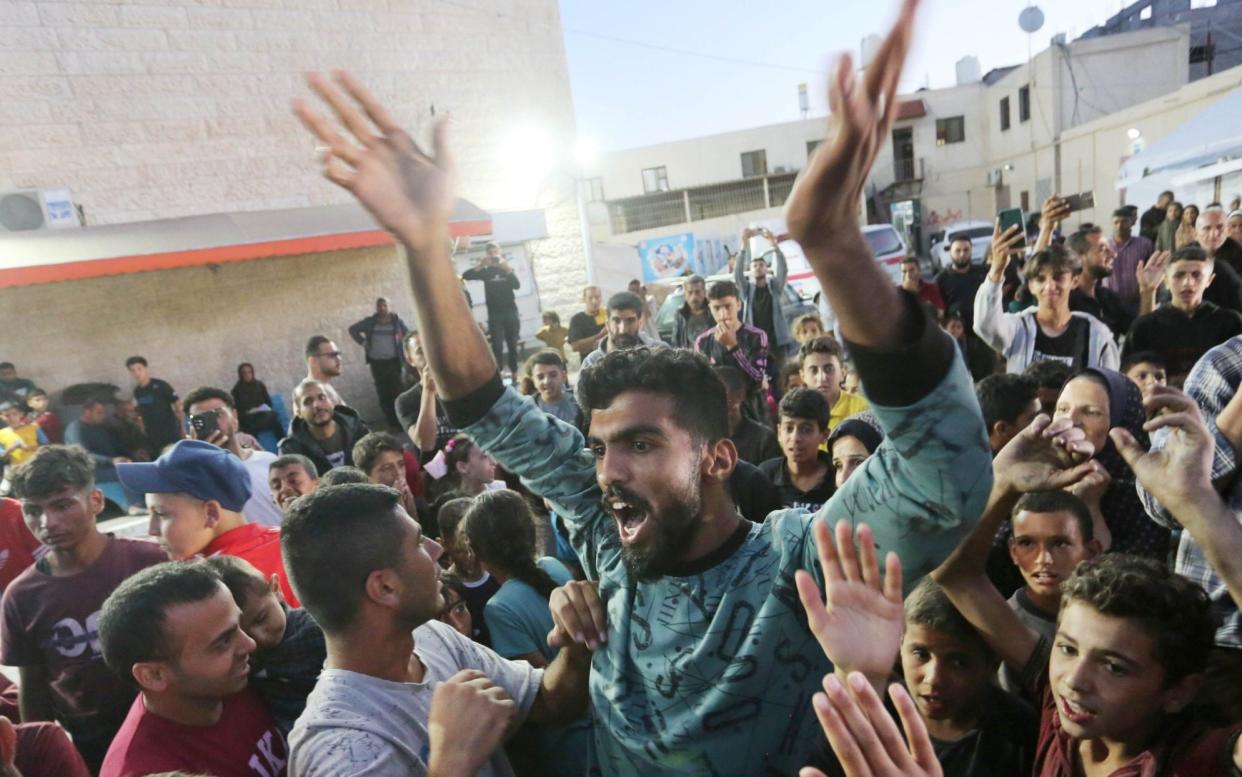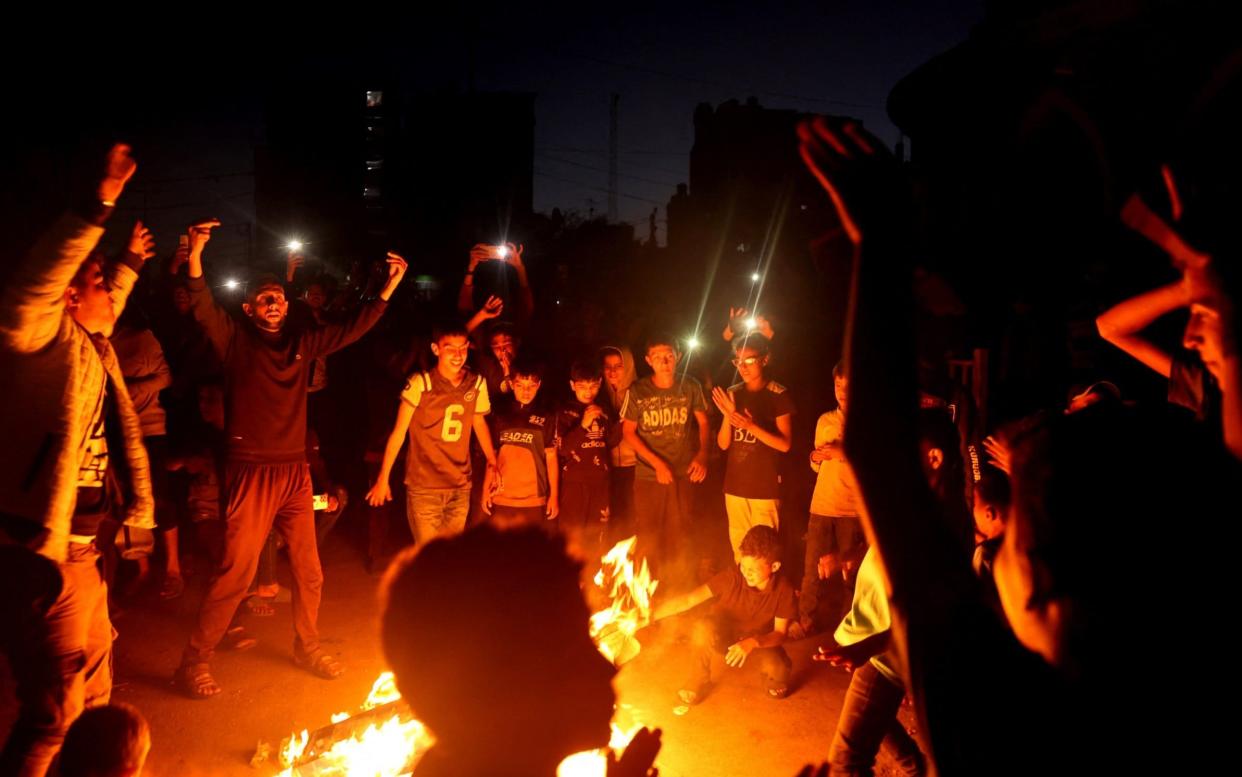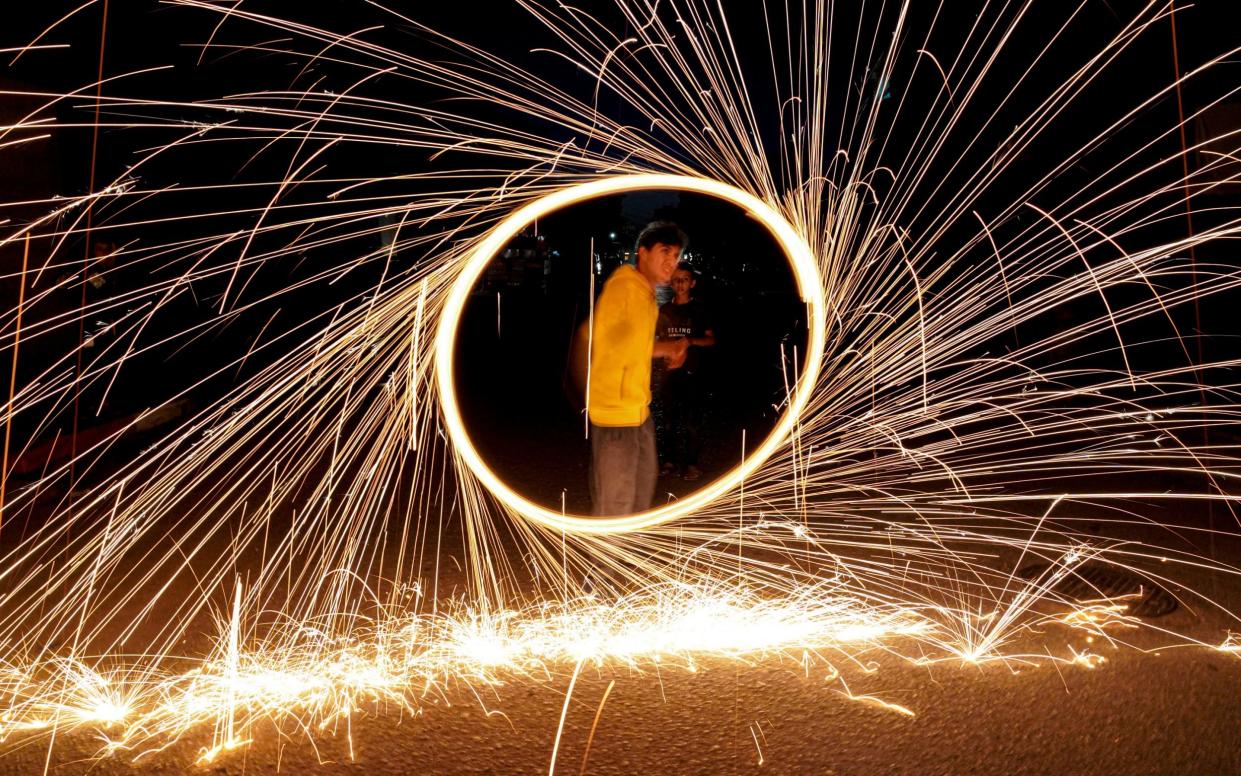Rafah erupts in celebration after Hamas accepts ceasefire offer even as Israeli offensive continues

Palestinians in the city of Rafah erupted in cheers as news of a potential ceasefire deal broke on Monday, hoping it would prevent an Israeli invasion of the sanctuary where more than one million people have taken shelter.
In one square in the southern city near the border with Egypt, young men clapped, danced and rode on each other’s shoulders shouting “Allahu Akbar”.
Children joined in the celebrations with some climbing to the top of a white van as onlookers filmed on their phones.
As night fell, other young Gazans wearing football shirts danced around a fire as celebrations spread through the embattled enclave which has been devastated by more than seven months of war.
But the jubilation appeared premature as Israeli officials briefed that Hamas had in fact carried out a “ruse” by accepting a ceasefire deal that was not on the table, in an effort to paint Israel as the party obstructing peace.
Early on Monday, the IDF told more than 100,000 Gazans in the east of Rafah to evacuate the area ahead of an expected ground invasion.
Planes dropped leaflets urging residents to move north to the safe zone of Al Mawasi.
“The IDF is about to operate with force against the terror organisation in the area you currently reside. Anyone in the area puts themselves and their family members in danger,” the leaflets said.
With the world waiting for Israel to give its official response to Hamas’ reported agreement, the IDF launched fierce air strikes on Rafah, hitting 50 “terror targets”.
Said, a 35-year-old displaced man from northern Gaza, told The Telegraph on the phone from Rafah on Monday night: “There was a lot of tension in the morning because of the leaflets the army was dropping – many people were distressed and tried to leave, roads were clogged.

“In the evening we got the news: People want to be happy but they’re cautious and waiting, and we still hear bombings. We really hope the war in Gaza will stop and we will see better days.”
An exodus of Gazans from Rafah began in earnest on Monday morning, with families – many of whom have already been displaced several times – fleeing by car, horse-and-cart or on foot.
Mohammad Mughayer, a 45-year-old manager with the local civil defence, said that he was concerned about a lack of facilities in the purported safe zone of Al Mawasi.
“There is nowhere safe in Gaza, there is no sewage, no electricity (in Al Mawasi),” the father of two said, stopping to ask if the reporter could hear the thud of shelling in the background.
“Things are going to get more complicated.This will affect all the aid trucks entering through the south. People are terrified of what’s going to happen in the next few days if nobody stops Netanyahu and his government from this invasion.”
With communication increasingly difficult inside Rafah, Nimeh, a 45-year-old Arabic teacher who asked that her surname be withheld, told The Telegraph in voice notes that she would rather stay in Rafah as Israeli troops had previously targeted safe zones.
“I’m not leaving Rafah.. There is nowhere for us to go,” the mother of three who had fled Gaza City, said.
“I hope the world will wake up and do something. It’s very scary.”
Mohammed Jindiyah said that at the beginning of the war, he had tried to hold out in his home in northern Gaza after Israel ordered an evacuation there in October. He ended up suffering through heavy bombardment before fleeing to Rafah.
He’s complying with the order this time, but was unsure now whether to move to Muwasi or another town in central Gaza.

“We are 12 families, and we don’t know where to go. There is no safe area in Gaza,” he said.
Sahar Abu Nahel, who fled to Rafah with 20 family members including her children and grandchildren, wiped tears from her cheeks, despairing at a new move.
“I have no money or anything. I am seriously tired, as are the children,” she said. “Maybe it’s more honourable for us to die. We are being humiliated.”
The UN’s agency for Palestinian refugees (UNRWA) on Monday said it would stay in Rafah to continue providing aid.
“The agency will maintain a presence in Rafah as long as possible and will continue to provide life-saving aid to people,” the UNRWA said.
The agency, like most other NGOs, moved its headquarters to Rafah after swathes of northern Gaza were pummelled by Israeli air strikes.
Unicef, the UN’s agency for children, warned on Monday that some 600,000 Palestinian children in Rafah face “further catastrophe” as it urged Israel to cancel the evacuation orders.
Deadliest phase of the war
The UN says an attack on Rafah could disrupt the distribution of aid keeping Palestinians alive across Gaza. The Rafah crossing into Egypt, a main entry point for aid to Gaza, lies in the evacuation zone. The crossing remained open Monday after the Israeli order.
Jan Egeland, secretary-general of the Norwegian Refugee Council, condemned the “forced, unlawful” evacuation order and the idea that people should go to Muwasi.
“The area is already overstretched and devoid of vital services,” he said. He added that an Israeli assault could lead to “the deadliest phase of this war.”
Israel’s bombardment and ground offensives in Gaza have killed more than 34,700 Palestinians, around two-thirds of them children and women, according to the Hamas-run health ministry.
The tally doesn’t distinguish between civilians and combatants. More than 80 per cent of the population of 2.3 million have been driven from their homes, and hundreds of thousands in the north are on the brink of famine, according to the UN.



